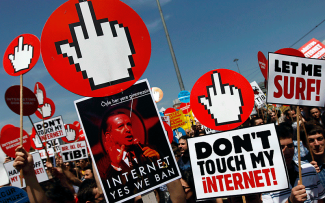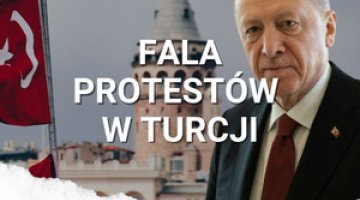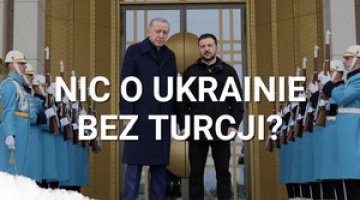Discipline and punish: how Turkey controls the internet

The Turkish authorities regard the internet – particularly social media platforms and messaging apps, which are increasingly used by citizens to exchange information rapidly – primarily as a threat: a domain of information warfare enabling foreign interference and a disruptive force to the traditional social structure. Consequently, in recent years, a comprehensive legal framework has been established to control this new sphere, effectively enabling top-down censorship, supported by a politicised judiciary.
The clearest example of its implementation is the regular and widespread blocking of access to online content. These blockades affect both major international social media platforms and individual articles by independent journalists. Such actions most frequently occur during periods of heightened criticism of the authorities. Most recently, a wave of blockades was introduced in an attempt to suppress anti-government protests following the arrest of Istanbul’s opposition mayor, Ekrem İmamoğlu. The emerging hardening of the authoritarian course in light of these events makes further restrictions targeting freedom of speech on the internet increasingly likely. The tightening control over the flow of information has also resulted in the emergence of grassroots strategies to circumvent censorship.
Towards a digital society
Internet usage in Turkey is widespread, encompassing nearly the entire population. According to data from the Turkish Statistical Institute (TÜİK), in 2024 as many as 88.8% of citizens aged 16 to 74 used the internet regularly.[1] The number of internet users has surged over the past two decades – for comparison, the figure stood at 53.8% in 2014 and only 18.8% in 2004.[2]
In Turkey, the internet is most commonly used for communication. According to the ‘Digital Turkey: 2025’ report, prepared by marketing agencies We Are Social and Meltwater in January 2025, nearly 67% of Turks use social media, and the average daily time spent online exceeds seven hours. In 2024, the country’s most popular online platforms were Instagram (used regularly by 92.2% of internet users), WhatsApp (90.6%), Facebook (71.1%), and X (60.5%).[3] The internet is also a major source of news. According to the Reuters Institute for the Study of Journalism, in 2024, 70% of Turks accessed news online, including via social media. Traditional media – though still relatively strong – are in decline. Television is considered the main source of information by 56% of respondents, while only 19% cite print newspapers (compared to 75% and 50%, respectively, in 2015). News is most frequently consumed online via smartphones (83%).[4] Online shopping is also growing in popularity, with more than half (51.7%) of respondents surveyed by TÜİK engaging in it. The most commonly purchased items and services online include clothing, footwear, food delivery, and grocery shopping.[5]
Turkey has made considerable progress in the digitalisation of public services. According to the European Commission’s ‘eGovernment Benchmark 2024’ report, its e-administration is more advanced than in the EU, with Turkey scoring 83 points compared to the EU member state average of 76. As much as 99% of government administrative services are available online.[6] A key element of this success is the government website e-Devlet Kapısı (turkiye.gov.tr), which enables citizens to handle numerous official matters through digital identity verification. In 2024, it ranked as the sixth most visited website nationwide, while its mobile version was the most downloaded app.[7]
A mental map of the internet
Turkey’s authorities often present modern technologies as the foundation for the country’s economic and social development. Growing interest in innovation is accompanied by significant investment in electromobility, the domestic defence and space industries, and efforts to promote Ankara’s achievements in these areas. In this narrative, broadly defined security and sovereignty – including technological sovereignty – have come to occupy a central role. The government views social media platforms as a threat to these values. They are cited as examples of technological dependence on the West, tools for spreading ‘imperialist’ narratives and foreign social norms, and instruments of interference in the country’s internal affairs.[8] The growing consumption of streaming platform content is portrayed as the supposed cause of cultural shifts deemed undesirable by the ruling Justice and Development Party (AKP), including increasing social atomisation and declining birth rates.[9] Other perceived dangers include cybercrime, online gambling, and social media addiction.[10] Combating disinformation and manipulation has also recently become one of Ankara’s declared priorities.
Despite their ambivalent stance towards social media, the Turkish authorities have never outlined concrete plans to disconnect the country from the global internet or to create a tightly controlled national network modelled on China’s. In recent years, figures close to President Recep Tayyip Erdoğan have emphasised the need to develop competitive ‘national’ platforms of this kind,[11] but there are no signs of success in this area. Existing domestic social networking sites have been unable to rival the popularity of foreign tech giants. The only exception is Ekşi Sözlük – a text-based forum modelled on a dictionary, where users create and expand entries. It ranks as the 17th most visited website in the Turkish internet space.[12] Other local social media platforms hold only a marginal share of the market.[13]
At the same time, the internet serves as a tool for the authorities, who do not shy away from using it to conduct election campaigns. There have been instances of artificially generating engagement through troll farms and bots that spread pro-government narratives, likely linked to the youth wing of the ruling AKP.[14]
The Presidential Communication Centre (CİMER) is also worth mentioning. It is presented as an institution designed to maintain contact with citizens and enhance their participation in governance. It allows residents to submit requests and complaints to decision-makers, with submissions accepted via the website and mobile app. Each Turkish citizen may file one application per day. In 2024, CİMER received over 4.5 million submissions on a wide range of topics. At the same time, the platform may serve the government as a tool for building a system of mutual surveillance. There is also a political dimension to its operation – for example, the annulment of opposition mayor İmamoğlu’s diploma, which triggered a series of events leading to his arrest, stemmed from an investigation initiated on the basis of a complaint submitted via the Centre.[15]
Freedom of expression within the limits of the law
Ankara is thus focusing on measures aimed at tightening control over platforms operating in Turkey. Reports of restrictions on freedom of expression online continue to emerge regularly. The most recent wave of limitations on access to selected websites and social media platforms occurred at the end of March 2025, during the aforementioned anti-government protests sparked by the arrest of Mayor İmamoğlu (see below for further details).
Such actions are permitted under the current legal framework. The provisions of the 2007 Law on Internet Publications – subsequently amended multiple times – allow for blocking access to specific content or ordering a hosting provider to remove it. According to the law, such steps may be taken in cases involving: violation of personal rights, threats to life or health, child sexual exploitation, obscenity, promotion of drugs, gambling or prostitution, insult to Mustafa Kemal Atatürk (founder of the Republic of Turkey), or any other threat to public security. Access may be restricted even to individual articles or social media posts. In addition, the law requires foreign social media platforms with over one million daily users to appoint a legal representative and to store user data on servers located in Turkey. These platforms are also obligated to delete court-ordered content within four hours of notification and to submit semi-annual reports detailing content moderation, algorithms, and advertising policies. Failure to comply with these regulations may result in bandwidth restrictions and bans on placing advertisements.[16] A 2020 amendment had also allowed content to be removed or blocked without a court ruling, but the Constitutional Court repealed this provision in 2024.[17]
A request to block or remove content can be submitted to the court by: an individual or legal entity whose rights have been violated, a ministry, the president, or another authorised body. In certain cases defined by law (such as threats to public security), a blockade can be imposed immediately by decision of the Information and Communication Technologies Authority (BTK), which serves as the main executive body responsible for enforcing internet content regulations and is the originator of most takedown requests.[18] Significant authority in this area is also held by the Radio and Television Supreme Council (RTÜK), along with approximately 30 other entities, including various ministries (e.g. of trade, health, and culture), regulatory bodies (such as those overseeing capital markets or games of chance), the Supreme Election Council (YSK), the Directorate of Religious Affairs (Diyanet), and sports federations.[19]
The legal framework governing Turkey’s domestic information space also includes the ‘disinformation law’, adopted in 2022.[20] Its most restrictive provision establishes a penalty of one to three years of imprisonment for publicly and knowingly ‘spreading false information about Turkey’s internal and external security, public order, and state welfare’. Within two years of its enactment, approximately 1,500 legal proceedings had been initiated under this law, including 66 against journalists. The press community has criticised the legislation for its vague and imprecise wording, which leaves broad scope for interpretation.[21]
Additionally, since 2022, the Centre for Combating Disinformation has operated under the Presidential Directorate of Communications. It effectively functions as a government propaganda tool, primarily ‘fact-checking’ statements made by opposition politicians and content published by media outlets critical of the authorities.
Block and rule!
Control over social media and the accompanying legal measures are part of Turkey’s growing authoritarianism. While new technologies facilitate information exchange for citizens, they also provide the authorities with new tools for surveillance. In Turkey, such actions are most often justified by the need to ensure security and public order, as well as to prevent foreign interference. Freedom House classifies Turkey as ‘Not Free’ in terms of both civil liberties and freedom of expression on the internet. In its ‘Freedom on the Net 2024’ report, Turkey ranked 56th out of 72 countries surveyed. The organisation highlights numerous abuses, including excessive website blocking and top-down orders to restrict access to specific content, such as articles exposing corruption in the president’s inner circle.[22] The enforcement of these laws lacks transparency: the relevant authorities do not publish data on content takedowns, and the legal basis for blocking decisions is often not made public.
In Turkey, access to thousands of websites and online platforms has been permanently or temporarily blocked. According to the non-governmental Freedom of Expression Association (İFÖD), a record number of restrictions were imposed in 2023 alone, affecting 950,000 domains, 260,000 URLs, and around 67,000 tweets.[23] Both individual activist posts and major tech platforms have been subject to these bans. One of the most widely reported cases occurred in 2017, when Wikipedia was completely blocked. Ankara justified the move by citing a ‘smear campaign’ – Wikipedia had refused to remove content concerning Turkey’s involvement in the Syrian civil war, including its alleged support for Islamic State.[24] Wikipedia became accessible again in 2020 following a ruling by the Constitutional Court. Another high-profile incident occurred in February 2023, when access to Twitter was blocked. Just hours after a devastating earthquake struck southeastern Turkey, the platform was shut down nationwide. Although the decision was officially justified as a measure to ‘combat disinformation’, it effectively hindered the exchange of information regarding missing persons.[25]
In August 2024, access to Instagram was blocked for nine days. The authorities justified the move by citing the platform’s prior moderation actions, which had targeted posts expressing condolences following the fatal assassination of Ismail Haniyeh, the political leader of Hamas. Access was restored only after Meta, the platform’s owner, agreed to unspecified concessions that were not disclosed to the public.[26] That same year, citing the need to protect children from moral corruption, the government also blocked access to the gaming platform Roblox, the amateur writing site Wattpad,[27] and the anonymous communication platform Discord.[28]
Restrictions also extend to media outlets. The websites of foreign broadcasters Voice of America and Deutsche Welle have been inaccessible in Turkey since 2022. They were blocked at the request of RTÜK (the Radio and Television Supreme Council) after the broadcasters failed to comply with the legal requirement to obtain a broadcasting licence. Both stations refused to apply for the licence due to concerns about potential interference with the content of their reporting.[29]
The case of protests in defence of İmamoğlu
The existing mechanisms of internet oversight become particularly visible during periods of political crisis and intensified criticism of the government. In the days following the arrest of the Mayor of Istanbul on 19 March 2025, which triggered a wave of social unrest,[30] İFÖD reported substantial bandwidth throttling affecting messaging services and social media platforms, including YouTube, TikTok, and Telegram.[31] Meta was reportedly fined a ‘substantial’ amount for failing to comply with an order to block accounts covering the demonstrations.[32] Access was also blocked to websites and mobile apps disseminating information about a consumer boycott organised by the opposition.[33]
Censorship was particularly evident on X (formerly Twitter). Under the pretext of ‘protecting national security and public order’, an unspecified number of accounts were blocked, many belonging to journalists, activists, and student organisations reporting on the protests.[34] The platform itself reported that the authorities had demanded the restriction of access from Turkish territory to more than 700 accounts.[35] This sweeping campaign prompted resistance from the platform, which had previously complied with government directives. X announced that it had appealed the BTK’s decision to the Constitutional Court[36] (which has not yet responded). On 24 April, based on a court ruling, the platform blocked access to İmamoğlu’s account, with the court once again citing the protection of national security and public order.[37] On 8 May, the same measure was applied to the mayor’s English-language account. The platform complied with both rulings but once again declared its intention to challenge them.[38]
The restrictions following İmamoğlu’s arrest led to a massive surge in the popularity of Bluesky, an alternative platform to X. As Turkish user numbers increased, Bluesky likewise became a target of censorship. On 20 May 2025, the Freedom of Expression Association (İFÖD) announced that, by court order, access to 63 accounts on the platform had been blocked on the grounds of protecting national security and public order.[39]
Outlook: boiling the frog
Repressive policies targeting online content naturally provoke responses from both content providers and users. Owners of blocked websites attempt to circumvent restrictions by creating alternative URLs. Turkish internet users are increasingly resorting to virtual private networks (VPNs), to bypass such blocks. Recently, however, censorship has not elicited strong public outcry. The latest wave of protests has focused more on the overall situation in Turkey and the state’s ongoing de-democratisation, of which crackdowns on freedom of expression are just one component.
However, internet oversight is reshaping the national media landscape. Increasingly, local news outlets are turning to crowdfunding models to finance their work. Traditional journalism is increasingly being supplanted by newsletters delivered directly to recipients’ inboxes – a model used, for example, by the opposition outlet Medyascope and journalist Murat Yetkin. Closed news channels on messaging apps are also growing in popularity (the Turkish-language branch of the BBC, for instance, maintains such a channel). Paradoxically, these formats further expand the space for disinformation and manipulation.
A key future tool for consolidating control over the internet may be the newly established Office for Cybersecurity, operating under the presidency. The Cybersecurity Act, adopted in March 2025, grants this body broad access to data from ICT systems and introduces prison sentences of two to five years for spreading false information about data leaks. The law also establishes a Cybersecurity Council responsible for shaping policy in this domain. The council includes, among others, the president, the minister of national defence, and the head of the intelligence agency. The new legislation has faced strong criticism from the opposition and civil society organisations, which argue that it poses a threat to press freedom and user privacy. The opposition Republican People’s Party (CHP) has submitted an application to the Constitutional Court seeking its annulment.
The opposition and civil society representatives have also expressed deep concern over the draft so-called Foreign Influence Agents Law, which has been debated multiple times in parliament but has not yet been put to a vote. Implementing such legislation could lead to further restrictions on freedom of expression and significantly intensify self-censorship among journalists. Owing to the widespread perception of deep politicisation within the judiciary, concern has been raised over a provision prescribing prison sentences of three to seven years for ‘offenses against the security of the state or its internal and external political interests in accordance with the strategic interests or instructions of a foreign state or organisation’.[40] If Ankara chooses to harden its authoritarian policy further, it is highly plausible that a similar law may be adopted in the near future.
[1] ‘Survey on Information and Communication Technology (ICT) Usage in Households and by Individuals, 2024’, TÜİK, 27 August 2024, data.tuik.gov.tr.
[2] ‘Information and Communication Technology (ICT) Usage Survey on Households and Individuals, 2014’, TÜİK, 22 August 2014, data.tuik.gov.tr.
[3] S. Kemp, Digital 2025: Turkey, DataReportal, 3 March 2025, datareportal.com, p. 89.
[4] N. Newman et al., Reuters Institute Digital News Report 2024, Reuters Institute for the Study of Journalism, pp. 110–111.
[6] eGovernment Benchmark 2024 – Factsheets, European Commission, June 2024, digital-strategy.ec.europa.eu, pp. 74–75.
[7] S. Kemp, Digital 2025: Turkey, op. cit., pp. 44–45, 47.
[8] ‘İletişim Başkanı Altun: Sosyal medya şirketlerinin yeni medya düzeni, dijital faşizm üreten bir algoritma diktatörlüğüdür’, T.C. İletişim Başkanlığı, 20 January 2023, iletisim.gov.tr.
[9] For more see Z. Krzyżanowska, ‘The Year of the Family – Turkey’s hopes for solving demographic issues’, OSW, 23 January 2025, osw.waw.pl.
[10] M. Yıldızalp, ‘İletişim Başkanlığının "21. Yüzyılda Türkiye'nin Bağımlılıklarla Mücadele Seferberliği" kitabı yayımlandı’, Anadolu Ajansı, 25 March 2025, aa.com.tr.
[11] ‘İletişim Başkanı Altun: “Yerli ve millî sosyal medya platformları üretmemiz gerekiyor”’, T.C. İletişim Başkanlığı, 5 August 2024, iletisim.gov.tr.
[12] S. Kemp, Digital 2025: Turkey, op. cit., p. 44.
[13] ‘Türkiye’de Geliştirilen Yerli Sosyal Medya Girişimleri’, Dijital Ajanslar, 20 September 2024, dijitalajanslar.com.
[14] S. Grossman et al., Political Retweet Rings and Compromised Accounts: A Twitter Influence Operation Linked to the Youth Wing of Turkey’s Ruling Party, The Stanford Internet Observatory, 11 June 2020, cyber.fsi.stanford.edu.
[15] Ç. Özer, ‘Transparency or surveillance? Citizen reporting tool operates in legal gray zone’, Turkey Recap, 18 March 2025, turkeyrecap.com.
[16] Kanun No. 5651: İnternet Ortamında Yapılan Yayınların Düzenlenmesi Vebu Yayınlar Yoluyla İşlenen Suçlarla Mücadele Edilmesi Hakkında Kanun, mevzuat.gov.tr.
[17] ‘Basın duyurusu: İnternet Ortamındaki Yayınlara ve Bu Yayınlar Yoluyla İşlenen Suçlara İlişkin Düzenlemeler İçeren Kanun’da Değişiklikler Öngören Bazı Kuralların İptali’, T.C. Anayasa Mahkemesi, 10 January 2024, anayasa.gov.tr.
[18] Submission to the 142nd Session of the UN Human Rights Committee for Consideration of the State Report of Türkiye, İfade Özgürlüğü Derneği, 2023, ifade.org.tr, p. 4.
[19] M.B. Kaya, ‘Türkiye’de İnternete Kim, Neden ve Nasıl Müdahale Ediyor?’, Mehmet Bedii Kaya, 25 August 2024, mbkaya.com.
[20] Kanun No. 7418: Basın kanunu ile bazı kanunlarda değişiklik yapılmasına dair kanun, 13 October 2022, Resmî Gazete, resmigazete.gov.tr.
[21] D. Tekin, ‘‘Sansür yasası’ nedeniyle iki yılda 4590 kişi hakkında soruşturma açıldı, 33 kişi tutuklandı’, MLSA Turkey, 20 November 2024, mlsaturkey.com.
[22] Freedom on the Net 2024: Turkey, Freedom House, freedomhouse.org.
[23] Y. Akdeniz et al., EngelliWeb 2023, Türkiye’de Adaletsizliğin Sembolü: Sulh Ceza Hakimlikleri ve İnternet Sansürleri, İfade Özgürlüğü Derneği, September 2024, ifade.org.tr, p. 2.
[24] A.S. Akçay, ‘Turkey: Wikipedia blocked for disregarding the law’, Anadolu Ajansı, 29 April 2017, aa.com.tr.
[25] Freedom on the Net 2024: Turkey, op. cit.
[26] ‘Turkey restores access to Instagram after 9-day block’, Reuters, 10 August 2024, reuters.com.
[27] ‘Yet again Turkey bans access to a website, this time to story-sharing platform Wattpad’, Duvar English, 17 July 2024, duvarenglish.com.
[28] ‘Turkey blocks Discord messaging platform’, Deutsche Welle, 10 September 2024, dw.com.
[29] ‘Turkey blocks access to Deutsche Welle, Voice of America for not getting licenses – official’, Reuters, 30 June 2022, reuters.com.
[30] For more see Z. Krzyżanowska, ‘Turkey: wave of protests following the arrest of Istanbul mayor’, OSW, 24 March 2025, osw.waw.pl.
[31] ‘Bant genişliği daraltılan platformlar’, İfade Özgürlüğü Derneği, 20 March 2025, ifade.org.tr.
[32] E. Gkritsi, ‘Meta faces ‘substantial’ fine for not complying with Turkey’s gag orders’, Politico, 1 April 2025, politico.eu.
[33] ‘Boykot siteleri erişime engellendi’, İfade Özgürlüğü Derneği, 27 March 2025, ifade.org.tr.
[34] ‘Sokak eylemleriyle ilgili bilgi ve içerik paylaşan X hesapları erişime engellendi’, İfade Özgürlüğü Derneği, 22 March 2025, ifade.org.tr.
[35] A tweet by Global Government Affairs, 23 March 2025, x.com.
[36] A tweet by Global Government Affairs, 26 March 2025, x.com.
[37] ‘Ekrem İmamoğlu’nun X hesabı erişime engellendi’, İfade Özgürlüğü Derneği, 24 April 2025, ifade.org.tr.
[38] A tweet by Global Government Affairs, 8 May 2025, x.com.
[39] ‘Bluesky, birçok hesabı Türkiye’den görünmez kıldı’, İfade Özgürlüğü Derneği, 20 April 2025, ifade.org.tr.
[40] D. Akdeniz Belovacıkı, D. Kuru, ‘Türkiye’de son dört yılda yasal düzenlemeler çerçevesinde insan hakları’, Bianet, 5 February 2025, bianet.org.




